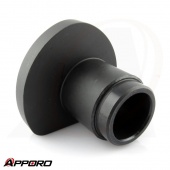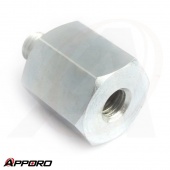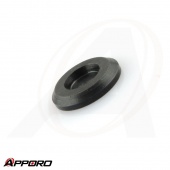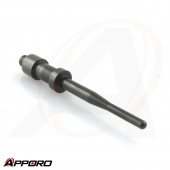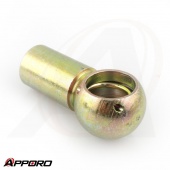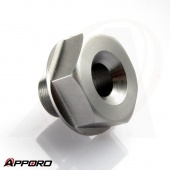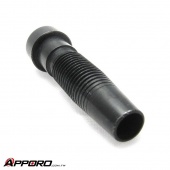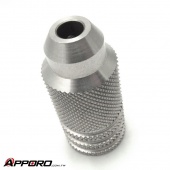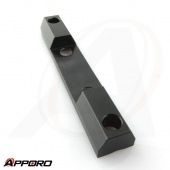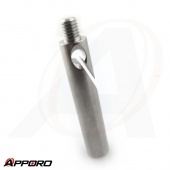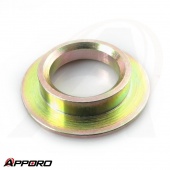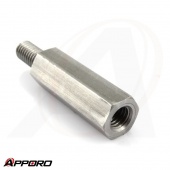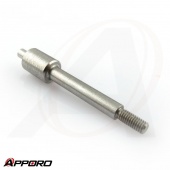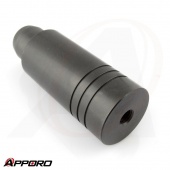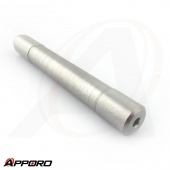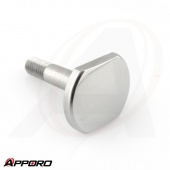- CNC Milling Machining Parts
- CNC Lathe Machining Parts
- Stamping
- Plastic Injection
- Die Casting
- Analytical Chemistry
- Auto parts
- Camera Components
- Hose Fittings
- Lighting Application
- Medical Supply
- Robot
- Plastic
- Alloy Steel, Carbon Steel
- Aluminum Alloy
- Brass, Bronze, Copper
- Stainless Steel
Alloy Steel, Carbon Steel
Different types of Alloy Steel
Alloy steel(*Ref 1.) is kind of carbon steel that is alloyed with a variety of elements in order to improve its mechanical properties. For example, strength, hardness, toughness, wear resistance, corrosion resistance and hardenability. Heat treatment may be required to achieve some of above improved properties.
AISI 4140 (SCM 440, 42CrMo4)
Most common alloy steel in CNC machining services. Averge machinability, good strength and stifness, good weldability for structure purpose. Widely used for shaft, transmission component, gear, mold, cold forging of automotive and industrial spare parts.
AISI 4340 (SNCM 439, 40CrNiMoA)
High toughness and strength in heat treated condition, good ductility and formability in the annealed condition. Averge machinable and welding capability. Mainly used in power transmission gears and shafts, aircraft landing gear, and other structural parts.
AISI 8620 (SCNM 220, 21NiCrMo2)
Common alloy steel used in bearing in dustrial. High hardness, anti-corrosion, contact fatigue strength after carburizing treatment, while the center of component remains tough and malleable. Mainly used in many internal engine components, suspension parts, bushings and automotive parts
AISI 4115 (SNCM 415, 15CrMo5)
Generally carburized for use, surface hardness can be between HRC 56-60 after case hardening. Mostly used as piston, transmission shaft and gear, spindle.
*Ref 1. Alloy Steel
Different types of Carbon Steel
Frankly speaking, carbon steel(*Ref 2.) is kind of steel with carbon content less than 2.1% by weight. Actually, we can generally use the term "carbon steel" to describe steel which is not stainless steel. As the carbon content increases, carbon steel is with better machinability able to get harder and stronger with heat treating treatment, but becomes less ductile.
AISI 12L14 (JIS SUM24L, DIN 9SMnPb36, free cutting steel)
So called free cutting steel(*Ref 3.) with excellent CNC machining capability. AISI 12L14 dosed with Lead can significantly improve its machinability. Can be case hardened to HV450. Available in square, round, and hexagon form. Generally used for shafts, bolts, valves, bushings, pins, fittings, machine screw, surgical and dental procedures utensils, certain automobile parts, instruments, etc.
AISI 1215 (JIS SUM23, DIN 9SMn36, free cutting steel)
AISI 1215 are resulphurized and rephosphorized free machining steels with excellent machinability. It forms small chips when machined. Nickel plating, chrome plating, zinc plating on 1215 steel are helpful for anti-corrosion. Mainly supplied for heavily machined components and parts subject to low stress levels, low shock loading.
AISI 1015 (JIS S15C)
One of mostly used low carbon steel. Lower strength compare to medium carbon steel, but good toughness, weldability, punching press properties. AISI 1015 is often used for manufacture of chain, rivets, bolts, shaft.
AISI 1045 (JIS S45C)
One of generally used medium carbon steel. Good wear-resistance and high strength. Capable of hardening by heat treatment to HRC 45. Widely used in mechanical parts and structural steel, such like sleeve, automobile shell, pistons, steam turbine, shafts of machine, worm, gear, crankshaft, spindle.
AISI 1144 (JIS SUM43, free cutting medium carbon steel)
One of often used medium carbon steel, contained Sulfur to enhance its machinability, so called free cutting medium carbon steel. Also featured with good wear-resistance and high strength. Mainly supplied for transmission components, such like gears, shafts, bolts, valves, bushings, pins, fittings, spring seat and machine screw, surgical and dental medical components, automobile parts, industrial instruments spare parts, etc.
JIS SK4 (SK95)
Contained 0.9-1.0% carbon by weight ratio, so called high carbon tool steel with great toughness, high strength and good wear-resistance. High hardenability, can be tempered to hardness at least HRC 62, less deformation in quenching. Generally used in a wide range of industrials including regular springs, spiral springs, knitting needles, horns, measuring tapes, pins, shafts, plug gauges and washers.
JIS SK5 (SK85, spring steel)
Contained 0.8-0.9% carbon by weight ratio, one of most common high carbon tool steel with great toughness, high strength and good anti-corrosion. High hardenability, can be tempered to hardness at least HRC 62, less deformation in quenching. Tempering treatment is required to improve springiness of machined parts made of JIS SK5. Generally supplied for industrial components such like automobile parts, blades, regular springs, clips, washers.
JIS SK7 (SK65, spring steel)
Contained 0.6-0.7% carbon by weight ratio, one of most common high carbon tool steel. High hardenability, can be tempered to hardness at least HRC 59, less deformation in quenching. Tempering treatment is required to improve springiness of machined parts made of JIS SK7. Generally supplied for industrial components such like automobile parts, coil springs, clip springs, washers.
*Ref 2. Carbon steel
*Ref 3. Free cutting steel: this kind of steel enables CNC lathe with automatic feeding equipment to run without human interaction which means efficiency and economic.

